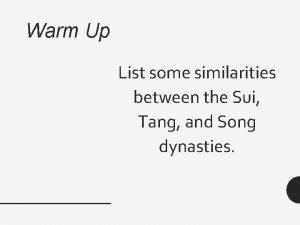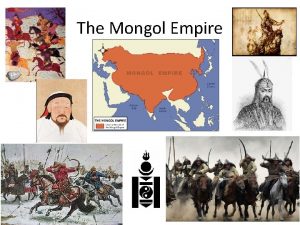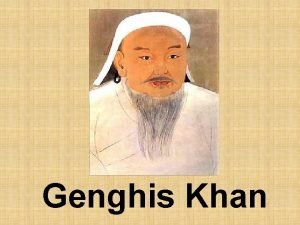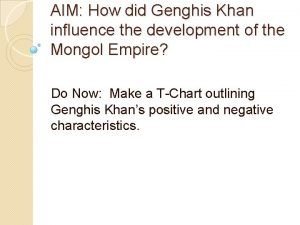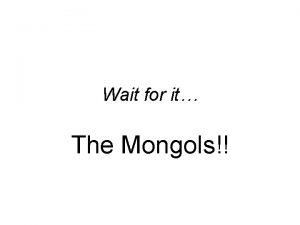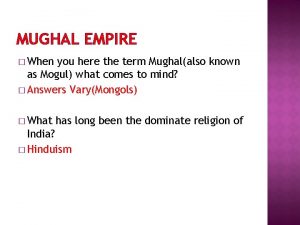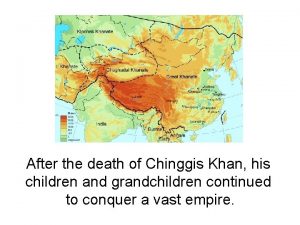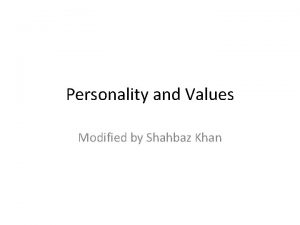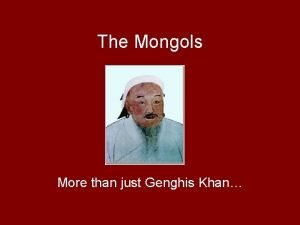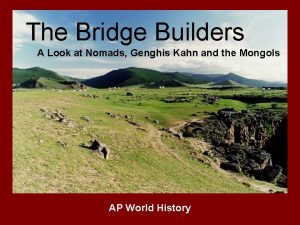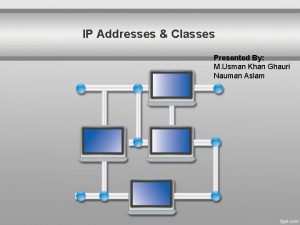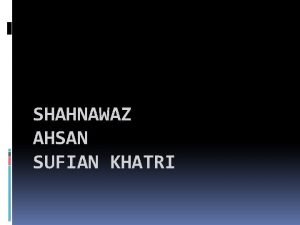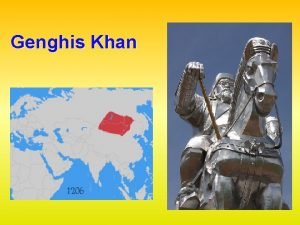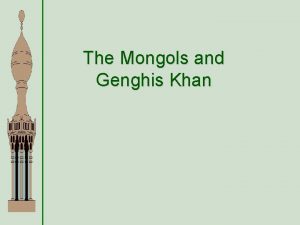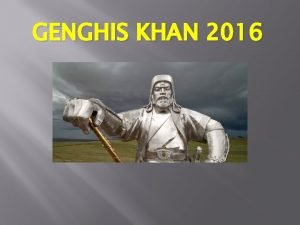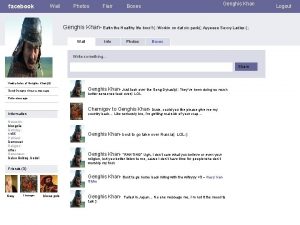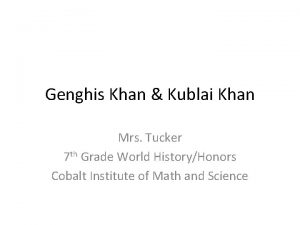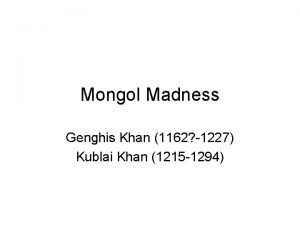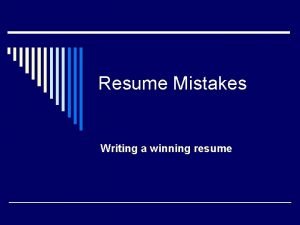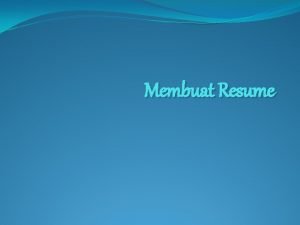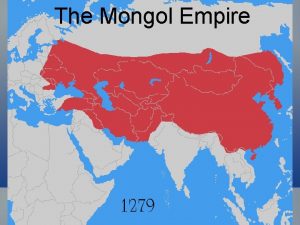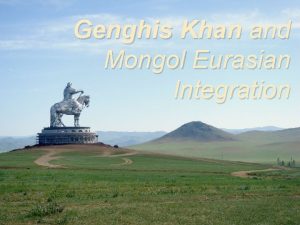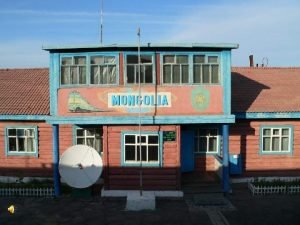The Life Times of Genghis Khan Resume of























- Slides: 23

The Life & Times of Genghis Khan

Resume of a Pastoralist Warrior on Horseback • Also spelled as Chingis Khan, Jenghis Khan, etc. • Born probably in Mongolia bet. 1155 -1167 as Temüjin (translates into English as "Smith" or "Blacksmith", ) & died 1227 • Arguably the most successful military leader who united the Mongol tribes • founded the Mongol Empire (1206 -1368), the largest contiguous empire in world history • United the Mongol tribes by giving them a common identity

The Conquest of Eurasia Warriors on horseback. . . The cutting edge of 13 th century technology

Agriculturalists vs. Pastoralists “The Mongol conquests and the empires they produced were the most formidable nomadic challenge to the growing global dominance of the sedentary peoples of the civilized cores since the great nomadic migrations in the first centuries C. E. . In most histories, the Mongol conquests have been depicted as a savage assault by backward and barbaric people on many of the most ancient and developed centers of human civilization. Much is made of the ferocity of the Mongol warriors in battle; their destruction of great cities. . . And their mass slaughters of defeated enemies. ”

This group was typical of the nomadic pastoralist peoples who nurtured a running feud between themselves and the more sedentary agriculturalist populations from the earliest of recorded history The pastoralists maintained a competitive edge until around the “Gunpowder Empires” of Europe during the Early-Modern period of the 15 th and 16 th centuries


Genghis Khan’s Military Skills • Often outnumbered in battle, he won nonetheless through use of superior intelligence, better mobility (and speed thanks to its cavalry), and greater endurance • The use of “fear tactics” by destroying entire cities and their populations if they resisted • The Mongols were natural warriors made physically tough by their harsh environment and being accustomed to killing and death • They were courageous and loved combat

Genghis sportingly offered enemies a choice: surrender or die. If they decided to fight, the khan was as good as his word, and they died — all of them, men, women, and children — but those who elected to pay fealty to the conqueror lived in peace under Mongol protection. The price of this privilege for the defeated was the mass-sacrifice of their native aristocracy and the export of their treasure to his coffers.

Venture into Psychobiography • Ghengis Khan came to see himself as a man marked for a special destiny • Second son of Yesukhei, a tribal chief of the Kiyad. Yesükhei's clan was called Borjigin (Боржигин). • Genghis' early life was difficult. His father delivered him to his future wife's family when he was only nine. • He was supposed to live there until he reached the marriageable age of 14. • He consistently displayed a sense that people were about to betray him.

It is not entirely clear what Genghis was truly like, but his personality and character were doubtless molded by the many hardships he faced when he was young, and in unifying the Mongol nation. Genghis appeared to fully embrace the Mongol people's nomadic way of life, and did not try to change their customs or beliefs. As he aged, he seemed to become increasingly aware of the consequences of numerous victories and expansion of the Mongol Empire, including the possibility that succeeding generations might choose to live a sedentary lifestyle.

More Personal Background • Shortly thereafter, his father was murdered by the neighboring Tartars while returning home • This gave Temüjin a claim to be the clan's chief, though his clan refused to be led by a boy and soon abandoned him and his family. • For the next few years, he and his family lived the life of impoverished nomads • During these difficult years, he learned many lessons on survival in the harsh political climate of Mongolia • Temüjin managed to unite the tribes under a single system by 1206, using his personal charisma and strong will.

“Energies once devoted to infighting were now directed toward conquest and the forcible exaction of tribute, both in areas controlled by other nomadic groups and in the civilized centers that infringed the steppes on all sides. ”

The Significance of Subduing Tribalism • Ancient Israelites—until united under a monarchy, they were at the mercy of their neighbors • The American Indian—failure to present a united front to 17 th century European settlers resulted in their demise • Africa today—destructive internecine warfare

At a Kuraltai (a council of Mongol chiefs) he was acknowledged as "Khan" of the consolidated tribes and took the name Genghis Khan (1206) or “Universal Ruler” This unification of all confederations by Genghis Khan established peace between previously warring tribes

Genghis Khan vs. Jamuka • Jamuka maintained traditional divisions between tribes in his forces • Jamuka assigned commands by hereditary rank rather than merit • Genghis Khan focused on what unified the tribes rather than what divided them • He valued ability more than social standing • He refused to divide his troops into different ethnic enclaves, instead creating a sense of unity

Wars of Expansion • Central Asia— China and Mongolia • The Middle East • Europe and Caucasus His empire was built on the fall or conquest of at least twenty (20) kingdoms: the Tartars, the Merkits, the Keraïts, the Naïmans, the Ouighours, the Tangout (Si. Hia), Northern China (Kin), Southern China (Sung), the Khitans, the Kara Khitaï, the Kharesmian empire, the Russian principalities, Armenia, Georgia, Korea, etc

Policies of Conquest • Genghis preferred to offer opponents the chance to submit to his rule without a fight • When they did not, he was merciless • There also were instances of mass slaughters even where there was no resistance, especially in Northern China, where the vast majority of the populations had long histories of accepting nomadic rulers

Imperial Policy Cultural Pluralism • The Mongol Empire was tolerant of the beliefs of its people, provided that they did not resist • Mongol rulers often let conquered nations keep local rulers and worship their own religions—an enlightened despot? • Taxes were heavy, and conquered people were used as forced labor

Imperial Policy • Genghis Khan's policy of unrestricted trade and communication brought up the concept of Pax Mongolica • As long as traders and messengers did nothing to damage the Mongol Empire, they were given peace for trade and information • “Paradoxically, Mongol expansion, which sedentary chroniclers condemned as a ‘barbarian’ orgy of violence and destruction, also became a major force for economic and social development and the enhancement of civilized life”

Genghis' successors continued to rule and expand the Mongol Empire he founded, after his death. Mongol Empire— 1300 -1400 Genghis Khan’s most noteworthy successor, his grandson Kublai Khan (c. 12161294)


But within a couple of generations, this rags-to-riches tale turned into a cliché, with a cliché's inevitable ending: The descendants of the great khan, swaggering with booty and rather too fond of their mighty pleasure-domes (which they did decree), lost their will to power. There were the usual civil wars, several failed campaigns, a spate of poisonings, and a few palace coups. Ominously, no longer were the Mongols feared. And then, in the mid-1300 s, the Black Death visited itself upon the Mongols as on others. Trade ceased, as did the flow of tribute. The Mongol periphery lost contact with the Mongol core, and soon afterward the Mongol Empire just up and slipped away.

Like the Islamic expansion that had preceded it, the Mongol explosion laid the foundations for more human interaction on a global scale, extending and intensifying the world network that had been building since the classical age. ” Chapter 14 of your text gives particular attention to “the longstanding patterns of nomadic-sedentary interaction that shaped the character, direction, and impact of Mongol expansion. ”
 Genghis khan dna map
Genghis khan dna map Genghis real name
Genghis real name Genghis khan bloodline
Genghis khan bloodline Septum secondum
Septum secondum How much land did genghis khan conquer
How much land did genghis khan conquer Who were the mongols
Who were the mongols Genghis khan and babur
Genghis khan and babur Genghis khan gerbil
Genghis khan gerbil Kublai khan children
Kublai khan children 16 personalities.com/free-personality-test
16 personalities.com/free-personality-test Genghis khan
Genghis khan Genghis khan
Genghis khan Genghis khan 168-0
Genghis khan 168-0 M step practice
M step practice Genghis khan academy
Genghis khan academy 15 times 15 times 20
15 times 15 times 20 Genghis robot
Genghis robot Early life of sir syed ahmed khan
Early life of sir syed ahmed khan When and where was shakespeare born
When and where was shakespeare born Life and times of william shakespeare
Life and times of william shakespeare Life and times of the ant
Life and times of the ant Shakespeare life and times
Shakespeare life and times Hát kết hợp bộ gõ cơ thể
Hát kết hợp bộ gõ cơ thể
